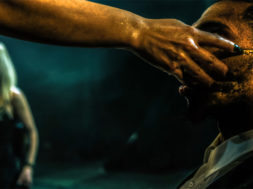![[LP REVIEW] Joanna Newsom- Divers](https://thesightsandsounds.com/wp-content/uploads/2015/11/ftimage.jpg)
[LP REVIEW] Joanna Newsom- Divers
Divers is Joanna Newsom’s latest musical effort and her first in five years. When she debuted Newsom was quickly lumped, along with other alternative acts like Devendra Banhart and the Dirty Projectors, into a “Freak folk” genre seemingly invented by music critics looking to rename their “Miscellaneous” folder. Even favorable reviews still painted Joanna as a bit of a freak. She’s expressed her resentment at seeing herself so often described by the media as a ‘fairie’ or some other mythical woodland creature. Reviewers grasping for descriptors presumably went blank when presented with an eccentric girl plinking a harp and warbling Aesop fables about circus animals and celestial bodies.
_______
___________
The new record Divers is intense and expansive. ‘Anecdotes’ sets the tone: dueling harp and piano arrangements, orchestral swells, a complex vocal melody, and an updated sound with synths near the end. Joanna Newsom’s music has always sounded rather old school – lyrics steeped in the past with electronic instruments all but absent from her songs. Divers, however, brings modern-ish tools to the forefront on occasion to great effect. The Mellotrons and electric guitar anchoring the acrobatic vocals of ‘Leaving the City’ are startling and hypnotic. ‘Goose Eggs’ features a Baroque harpsichord melody reminiscent of the Procol Harum hit ‘A Whiter Shade of Pale’ before it dissolves into warm keys and electric organs during the refrains.
And Time, in our camp, is moving
As you’d anticipate it to
‘Same Old Man’, a Karen Dalton cover, could be a lost cut from Joanna’s debut if not for the Minimoog synths that kick in to punctuate the song. The sheer multitude and variety of instruments accompanying Joanna’s controlled vocals dispel any lingering notions of her as ‘That One Freaky Harpist’. And, as a result, when Joanna does appear alone with her harp, it feels intimate and personal, less “gimmicky” as some have claimed before.
I know we must abide
Each by the rules that bind us here
The divers and the sailors
And the women on the pier
Joanna divulged in an interview with the L.A. Times that she played an executive role in mixing the album, a process which took two years to complete. It’s clear why: upon closer listening the music sounds painstakingly calculated to match the lyrical content of each song. The most striking example of this is ‘Divers’, the album’s namesake and the longest song at seven minutes. From the perspective of a woman in love with a deep sea diver centuries ago, Joanna laments that she can’t join him due to her role in society. The song starts with a lone, swirling harp, but begins to sound downright aquatic when a Hohner guitaret and pounding piano are added to the mix around halfway through. Somehow, the music creates the sensation of being gradually submerged in water, slowly sinking to the ocean floor, until the narrator finally adopts a more cynical stance on love.
And never will I wed
I’ll hunt the pearl of death to the bottom of my life
The lyrics alone make the title track one of Divers’ high points, but Joanna’s poetic finesse shines throughout. This record may be her most lyrically cohesive yet, the overall theme being time and its effect on space. On the surface, the jovial parlor-esque number ‘Sapokanikan’ seems to be about New York City’s history. There are explicit references to Sapokanikan, the Native American village which we now know as the borough of Manhattan, and John Purroy Mitchel, a former NYC mayor who fell from a plane and is now found memorialized in Central Park. But the larger idea of the song is the way time negates everything that was once important: lines like “the records they left are cryptic at best/lost in obsolescence” and references to Ozymandias by Percy Bysshe Shelley drive this home.
When I woke, he was gone
And the War had begun
In eternal return and repeat
Notably, on this album Joanna’s lyrical perspective extends both into the past as well as events of the future in her own imagination. ‘Waltz of the 101st Lightborne’ whisks the listener away to a seaside shanty. Amidst blithe accordions and fiddles, Joanna sings a story of a woman in a sci-fi future whose husband returns from a space war, only to find that she’s in some sort of time loop. The cathartic finale ‘Time, As a Symptom’ brings back the full sound of the beginning of the record tenfold, featuring Joanna alongside her bandmates and the Prague Philharmonic Orchestra.
_________________
__________
By this point Newsom has gained a broader understanding of time – she sees it as a symptom of love, and not the other way around. The song slowly builds toward the record’s ultimate musical climax as she asserts:
Stand brave
Time moves both ways
In the nullifying,
Defeating,
Negating,
Repeating
Joy of life.
She’s learned how to know the joy of life by living in the present moment. But her last words cut off abruptly and her voice echoes and fades away, suggesting that time and death have caught up with her just like everything else. The track works very well to bring the album full circle, even ending on the same note ‘Anecdotes’ begins with – a bonus for those listening on repeat.
Fans of Joanna Newsom who have been waiting years to hear more from her will no doubt revere Divers as a welcome addition to their music collection. More so than past releases, Divers is succinct, making it a spectacular introduction for newcomers. Listeners who have dismissed Joanna’s music in the past will want to take this opportunity to revisit it. They’ll hear something different, a formidable artist who’s truly pinpointed and perfected her sound. Either way, as Joanna sees it, give it some time. Another 50 years and this record will only be remembered by the ones who found the “joy-of-life” within its grooves.
_______
the records they left are cryptic at best
lost in obsolescence
83











